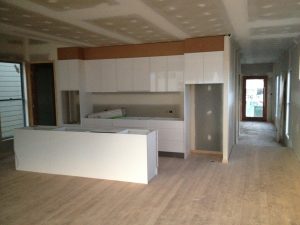
But, refinancing isn’t as straightforward as you might expect. The type of renovation proposed goes a long way to dictating the loan required. If the wrong loan is chosen, you could be left with a pile of unexpected debt.
Know your budget
Before considering refinancing, you need to have a clear idea of your budget.
If you underestimate your budget, you run the risk of getting knocked back from your lender, according to Dieter Stahmer, owner of The Loan Broker, Wynnum.
“Unfortunately, I sometimes see homeowners who have estimated a budget of say $100,000 to do renovations, only to discover it will cost a lot more,” Dieter says.
“This means you may have to reapply for the loan to finish the work off, which banks generally don’t like. Be conservative with your projections. If you think you need $100,000, maybe apply for a little extra, so that if there is a hiccup it doesn’t lead to indigestion.”
The next step is to speak to your broker to determine which loan will suit your needs and objectives.
Home equity loan
These are suitable if you are looking to make cosmetic upgrades to your property.
Installing a new bathroom or kitchen, painting the interior or exterior of the house and other basic construction falls under an equity loan.
These renovations, more often than not, do not supersede the costs of structural changes, so homeowners can call on up to 80 per cent of their Loan-to-Value Ratio (LVR).
The amount you can borrow is roughly your current property value multiplied by 80 per cent, less the amount of your current mortgage. To calculate your repayments click here.

Construction loans
Construction loans are suitable for structural work on your home, for example, if you’re adding a new room or lifting and building under.
Construction loans give homeowners the opportunity to access larger sums of money, with the amount dependent upon the expected value of the property after renovations are completed.
The advantage of a construction loan is that the interest is calculated on the outstanding amount, not the maximum amount borrowed. This means you have more money available in your kitty, and you only pay interest on the money as it is spent.
When applying for a construction loan, council approval and a fixed price-building contract are required, and a mortgage broker can assist with this to reduce the paperwork and stress, in addition to comparing interest rates in the market for you.
“When looking at both these loans, you could also call on other property you own to boost your overall borrowing amount”.
Broker advice
If you speak to a broker they will be able to determine which loan and will give you several options. This advice is essential, as a poorly planned construction loan could cost you more down the road.
When planning a renovation, one question you should be asking of a qualified mortgage broker is: ‘What type of loan am I eligible for?’, because if you don’t get your construction loan right, it can lead to additional costs or worse still an unfinished renovation.
Discussing your options with a mortgage broker is free, as it would be to talk to your existing bank…. The difference being a broker can access many loan across many lenders to get the right loan for you…. At no additional cost to you.
The specific loans above can be discussed with your broker, and if they aren’t suitable, there may be other options available to you. Speak to Dieter to make your grand renovation plans a reality.
Latest News
 QUESTIONS WHEN CHOOSING A BROKER?March 6, 2023 - 1:33 pm
QUESTIONS WHEN CHOOSING A BROKER?March 6, 2023 - 1:33 pm A POINT-BANK EXPLANATION: BROKER VS BIG BANK FOR YOUR FINANCE CHOICESMay 22, 2020 - 12:23 am
A POINT-BANK EXPLANATION: BROKER VS BIG BANK FOR YOUR FINANCE CHOICESMay 22, 2020 - 12:23 am A MORTGAGE BROKERS STATISTICS – WHICH BANK?July 22, 2019 - 12:16 am
A MORTGAGE BROKERS STATISTICS – WHICH BANK?July 22, 2019 - 12:16 am HOW DO LENDERS WORK OUT WHETHER YOU CAN AFFORD A LOAN?August 31, 2018 - 3:06 am
HOW DO LENDERS WORK OUT WHETHER YOU CAN AFFORD A LOAN?August 31, 2018 - 3:06 am HOUSING OUTLOOKAugust 22, 2017 - 12:26 am
HOUSING OUTLOOKAugust 22, 2017 - 12:26 am
Quick Links
Contact
Phone: 07 3904 7186
Email: loans@theloanbroker.com.au

